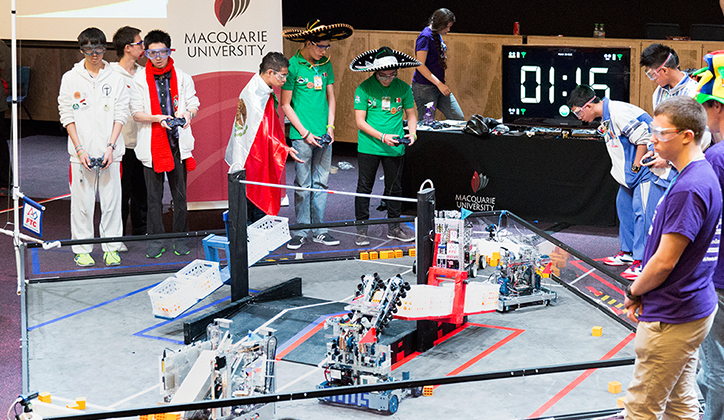25 teams of high school students from Australia, China, South Korea, Mexico, and the USA competed in the Macquarie Theatre last week during the second annual Asia Pacific Invitational (API), as part of the FIRST Tech Challenge (FTC) robotics competition.
FTC is part of an annual program of robotic events by FIRST (For Inspiration and Recognition of Science and Technology), developed to inspire students in engineering and technology fields. The API is a championship-level event attended by teams who have previously qualified at lower level, regional events.
Held over three days and culminating in a grand final last Friday, the teams, including coaches, mentors, and volunteers, were responsible for designing, building, and programming their robots, and developing a strategy to compete on a 4m x 4m field against each other.
The robots were built using a modular platform that’s reusable from year-to-year, and programmed using a variety of languages. Awards were given for the competition as well as community outreach, design, and other real-world accomplishments.
The 2014 ‘Block Party’ challenge saw competing robots undertake three tests. The first and second were undertaken by the robots autonomously (pre-programmed), and driver-controlled respectively, and involved the transition of 48 yellow blocks into goal scoring areas. In a third ‘End Game’ test, the robots had to raise their Alliance flag up a flagpole within 30 seconds, at the same time raising themselves off the ground using a bridge pull-up bar.
“These student-built robots demonstrate the same skills and encompass the kind of knowledge that are part of real engineering,” said Professor Michael Heimlich, Acting Head of Macquarie’s Department for Engineering.
“This, combined with the life skills that gets the team to this level of competition – like time management, team work, and communications – is what makes the students coming through the FIRST program so successful when they get to university and beyond.”
From Australia, teams competed from Hornsby Girls’ High School, Macarthur Anglican School, and James Ruse Agricultural High School, as well as a home schooled team, and two teams from Macquarie University and an independent team (comprised of students from multiple high schools).
“While the robot game provides the excitement and energy for the event, the real competition is in the judging room,” Michael says.
“Students must make formal presentations to a panel of judges, not only showing their engineering designs and how their robots were actually built, but also sharing how they’ve made their school, community, and in some cases the world more aware about the important role of scientists and engineers play in modern society.”
Awards are given out for various areas of expertise, but the Inspire Award is reserved for the team that acts as a role model team by demonstrating competency in all areas. This year, the Inspire Award was given to a neighbourhood team from Camden, NSW, “The Indivisibles” for their work in merging all FIRST programs in NSW, Australia, and beyond.

